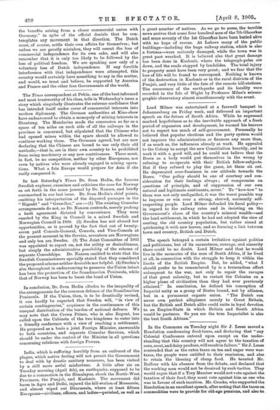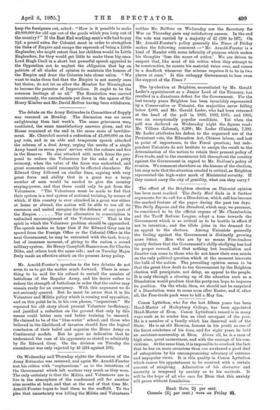In the Commons on Tuesday night Sir J. Leese moved
a Resolution condemning food-taxes, and declaring that "any Colonial Conference entered upon except on the under- standing that this country will not agree to the taxation of corn, meat;and dairy produce, will result in failure." Sir J. Leese contended that as the extra taxes on tea and sugar were war- taxes, the people were entitled to their remission, and also to retain the blessing of cheap food. He taunted Mr. Balfour with his absence from the debate, and declared that the working men would not be deceived by such tactics. They would argue that if a Tory Member would not vote against the taxation of their food, they must vote against him as one who was in favour of such taxation. Mr. Crooks, who supported the Resolution in an excellent speech, after noting that the taxes on commodities were to provide for old-age pensions, and also to. keep the foreigners out, asked : "How is it possible to make 29,000,000 for old age out of the goods which you keep out of the country F" If the East End working-man's wife had to pay 14d. a pound extra for Colonial meat in order to strengthen the links of Empire and escape the reproach of being a Little Englander, she might retort that her children would be Little Englanders, for they would get little to make them big ones. Lord Hugh Cecil in a short but powerful speech appealed to the Opposition not to neglect the obligation that lay on patriots of all shades of opinion to maintain the honour of the Empire and draw the Colonies into closer union. "We want to make them feel that the Empire is not merely ours but theirs; do not let us allow the Member for Birmingham to become the patentee of Imperialism. It ought to be the common heritage of us all." The Resolution was carried unanimously, the amendments put down in the names of Sir Henry Kimber and Mr. David McIver having been withdrawn.











































 Previous page
Previous page